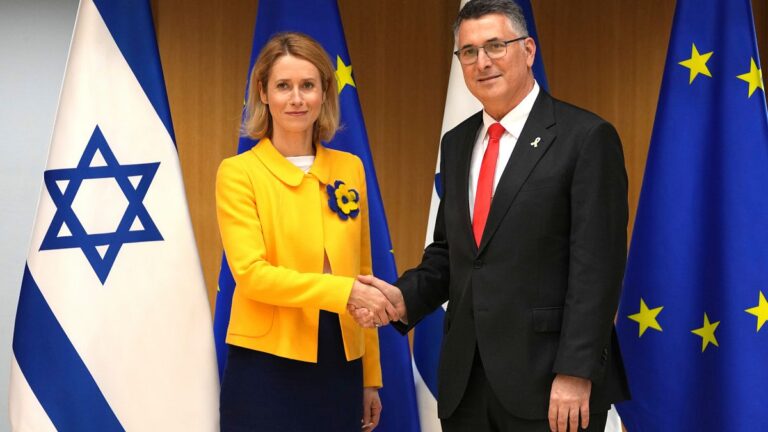
ADVERTISEMENT
Israel has taken some “notable positive” steps to improve the situation in Gaza including resuming fuel delivery, but the humanitarian situation is “very severe”, and the scale of destruction “unprecedented”, according to a confidential report seen by Euronews and circulated by the EU’s External Action Service to member states.
The report is a regular update presented to EU diplomats on Wednesday on the steps taken so far by Israel to implement a deal agreed with the bloc less than a month ago to improve humanitarian aid access into Gaza.
At the time the EU announced that it had agreed “significant steps”, including a “substantial increase” of daily trucks carrying food, the opening of several other crossing points, the reopening of bakeries and public kitchens and the protection of aid workers.
It was the result of efforts by the EU’s top diplomat Kaja Kallas and Christophe Bigot, the EU’s Special Envoy to the Middle East, to engage with Israel in order to solve the humanitarian crisis in Gaza.
But the document made clear that the EU has seen few of the agreed measures implemented.
“Significant obstructive factors continue to undermine humanitarian operations and aid delivery to Gaza,” the document said, citing “looting and casualties” at distribution points of humanitarian aid, airstrikes that still affect UN and NGO facilities, “staff being targeted”, as well as Israel’s recent efforts to “shorten the re-registration deadlines for international NGOs to seven days”.
Between 30-31 July, 105 Palestinians were reportedly killed and at least 680 injured in areas including Zikim, Morage and Middle Gaza, the report said.
The document listed as positive steps the resumption of fuel delivery, the reopening of the Egyptian and Jordanian routes, the opening of the Zikim crossing point in the north as well as the repair of some vital infrastructure, and “the upward trend” in the number of daily trucks entering Gaza.
“The volume of fuel which is currently entering Gaza is enough to sustain critical life-saving operations but not sufficient to allow all humanitarian programs to run,” the report said, citing an average of 125,000 litres of fuel per day. “Before July, fuel had not been let in for more than three months.”
Earlier this week, the Israeli defence body in charge of coordinating aid to Gaza, called COGAT, also announced that there had been a “gradual and controlled renewal of the entry of goods through the private sector in Gaza.”
But the report takes place at a time when Israel is facing global criticism over allowing starvation in the besieged strip and talks between Hamas and Israel remain at an impasse. The EU itself is struggling to respond to the current situation in Gaza.
Germany and Italy have been reluctant to agree on any sanctions against Israel, including the suspension of the EU-Israel association agreement or the partial suspension of Israel the Horizon Europe fund.
In addition, if Israel’s Prime Minister Benjamin Netanyahu confirms at a security cabinet meeting later today plans to take over the Gaza Strip, then the humanitarian deal brokered by the EU and Israel might become obsolete.
On Wednesday, the European Commission’s Executive vice-president Teresa Ribera called on countries which have voted down on any sanctions to Israel to choose “constructive abstention” in future votes, including on Horizon or the suspension of the association agreement.
“The situation of famine in Gaza is deeply concerning, and we believe it is time to overcome the current paralysis,” Ribera’s spokesperson told Euronews.
“Rather than focusing on institutional weakness…Can we find common ground? Is a kind of ‘constructive abstention’ possible?”


